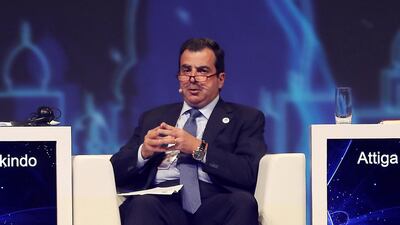The Arab Petroleum Investments Corporation (Apicorp) will look at supporting clients in the energy sector to tide over the difficulties of the Covid-19 pandemic, with disbursements of up to $2 billion this year.
Last year, the multilateral lender, which is owned by the 10 members of the Organisation of Arab Petroleum Exporting Countries, rolled out a $500m counter cyclical package to support sustainable projects in the conventional and renewabels space.
"Normally our annual both debt and equity financing for new commitments is in the range of, I would say $1.7-2bn US dollars to new projects, be it financed through debt or financed through equity to public and to private sectors sponsors," Ahmed Ali Attiga, Apicorp chief executive said in an interview with The National.
The Dammam-based lender reported a 3 per cent rise in net income for 2020, it said in a statement on Tuesday.
Net income rose to $115 million from the year-earlier period. Apicorp's performance was supported by significant capital gains from its treasury and capital markets portfolio. The portfolio gained 488 per cent after netting $46m in capital gains last year.
The lender's corporate banking portfolio grew 6 per cent, while the treasury and capital markets portfolio expanded 13 per cent year-on-year.
Apicorp is in the process of identifying projects in post-conflict countries such as Iraq and Libya, and will increasingly focus on environmental, social and governance norms when investing in new projects.
In Iraq, the bank is in discussions with "various stakeholders - government and the private sector and other multilateral financial institutions to support Iraq, particularly in the renewable energy space and of course in the mainstream petroleum industries," said Mr Attiga.
The company will increasingly focus on increasing renewable capacities within its portfolio, which accounts for 20 per cent of clean power projects.
Last year, around 65 per cent of Apicorp's project finance was directed towards green energy projects, said Mr Attiga.
The company, which was set up by oil producers, Saudi Arabia, the UAE, Kuwait, Libya, Iraq, Qatar, Algeria, Bahrain, Egypt and Syria, will continue its focus on petroleum investments, but will demand greater sustainability in return.
"Conventional investments and projects have to start incorporating much stronger ESG standards, both as a condition for the financing and then, as monitoring of the asset itself and how ESG standards are applied," said Mr Attiga.
Global wealth managers have shifted focus towards greater sustainability in investing, with BlackRock, the world's largest investment firm incorporating climate change standards and green energy into its portfolio.
The company will go back to the market towards the second half of the year with a potential debt issuance of $500m to $1bn, Mr Attiga told Bloomberg TV in an interview on Tuesday.
Apicorp's balance sheet grew 7.5 per cent to $7.89bn in 2020, which is 5 per cent higher in terms of compounded annual growth registered over the past five years.
The bank's liquidity ratio reached its highest-ever at 349 per cent.
Apicorp also raised its authorised capital to $20bn from $2.4bn. Subscribed capital was also increased to $10bn from $2bn, while paid-up capital was boosted by $500m to $1.5bn. The company's callable capital also rose to $8.5bn from $1bn.
Corporate banking assets rose 6 per cent to reach $3.9bn booking 1.6 billion in drawdowns over the course of 2020.
Notably, 6 of the 11 project finance commitments in 2020 were in green energy or within the category of sustainable utility projects, Apicorp said.
They were part of the $500m package Apicorp launched last year support regional energy sector navigate the impact of Covid-19 as well as oil price volatility.
The bank's non-performing loan ratio was low at 0.59 per cent.


